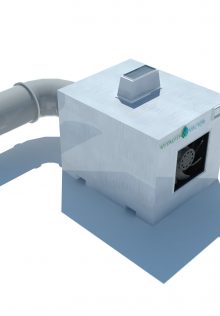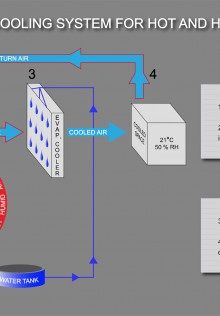-
DEW-POINT EVAPORATIVE COOLING TECHNOLOGY
An evaporative cooler is a device that uses the thermodynamic process of water evaporation to cool the air. It’s the process in which sensible heat is extracted from air and converted into latent heat without changing the enthalpy value.
Dew Point Cooling or Regenerative Cooling is a process that allows to cool the air below its wet-bulb temperature to the theoretical limits of dew- point by diverting a portion of the main airflow to be used as an auxiliary airflow in a heat-and-mass exchanger.
ADVANTAGES OF VITALITY VECTOR DEW-POINT COOLING. (RIDEC)
The Most Efficient System on the Market
Low Production Cost
Low Operation Cost (Single Source Fan)
Unique Wetting System (No Water Pump)
Saline Water Can Be Used as a Cooling Medium
Heat Recovery in Winter -
Desiccant assisted evaporative cooling system
Amidst the recurrent energy and environmental crisis, the evaporative cooling systems have become a viable alternative to the conventional vapor compression air conditioners. They are cheaper to install, maintain and operate than the traditional AC. However, a number of serious drawbacks significantly limits the scope of their applications. The evaporative cooling systems require dry air conditions to be effective, they add humidity to the air and a significant amount of water is required for the adiabatic process.
Vitality Vector has developed a desiccant assisted evaporative cooling system that can operate efficiently even in hot and humid environments, it controls the air humidity and produces water for adiabatic process. By dehumidifying the air first, we increase the cooling potential of the adiabatic process. The moisture, that is extracted from the air, is recovered to be used in the evaporative cooler.
The technology bares a slightly higher installation cost than the traditional evaporative cooling systems and requires a source of thermal energy to regenerate the desiccant. The thermal energy can be partially collected from solar radiation.

